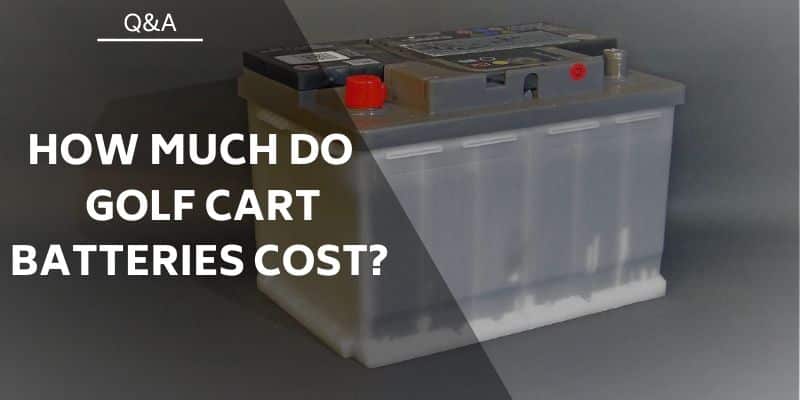In recent years, more and more people have been making the switch from lead-acid batteries to lithium golf cart batteries for their golf carts. Battery technology has come such a long way, that the old simply can’t compete with the new.
While it’s a well-known fact that lithium batteries are superior in almost every way, it can be tricky to know exactly what you should look for when buying one. In this guide, we’ll cover the benefits of using lithium and the things you should consider when buying them. Then, we’ll outline some of the best lithium batteries currently available on the market.
What Are the Advantages of Lithium Batteries for Golf Carts?
- Constant power – Unlike lead-acid batteries, lithium batteries operate at full power throughout discharge, even when they are at less than 5%. Low battery won’t result in sluggish performance.
- Lightweight – Lithium batteries are 50-60% lighter than their lead-acid equivalents. This makes them significantly easier to install. Plus, it increases your golf cart’s weight-to-performance ratio, enabling you to reach higher speeds with less effort. Even the best golf carts could benefit from being a little lighter.
- Fast charging – Lithium batteries can be fully charged within 1-3 hours. This is a vast improvement over lead-acid batteries, which can take over 8 hours to fully charge.
- Maintenance-free – No water needed, and no cleaning of acid residue required. Just charge them up, and they’re ready to go.
- Safety – Most lithium batteries utilize Lithium Iron Phosphate (LiFePO4), a chemistry that is inherently safe. In addition, Battery Management Systems (BMS) have been developed in order to regulate heat, eliminating the risk of overcharging and overheating.
- Long-life – Lithium batteries have up to a 10x longer life cycle than lead-acid batteries.
- Long shelf life – Lithium batteries have a very low rate of self-discharge, meaning they maintain a state of charge for longer when not being used.
- Eco-friendly – Due to their lower charge times, and the fact that they contain less hazardous materials, lithium batteries are far better for the environment than lead-acid batteries. They’re the best golf cart batteries for the environment by far.
Things to Consider When Buying a Lithium Battery for Your Golf Cart
Before you confirm a purchase, you’ll want to make sure you’re getting the battery that’s right for you by taking the following into consideration.
Battery capacity
Measured in Ah (ampere-hours), a battery’s capacity is the amount of power it can discharge in a single-use. In other words, it’s how long the battery will last before it needs recharging. Pretty much all lithium batteries will easily cover you for 18 holes of golf. Some batteries, with an AH of around 100, can run for as long as 36 holes.
Voltage
Voltage is basically the amount of electrical power that your lithium battery holds. 24v is a fairly standard amount of voltage for lithium golf cart batteries.
Dimensions
It’s essential to check the dimensions of your golf cart battery holder before you purchase a new battery. If you choose a battery that is larger than your holder, you will have a lot of difficulty keeping it secure. If you cross-reference the dimensions of your cart holder against the size of the battery, you can ensure your new lithium battery will be a good fit.
Most lithium batteries are roughly (W)160mm x (L)250mm x (H)200mm. Batteries with larger capacity tend to be slightly bigger. However, generally speaking, lithium batteries are nice and compact; they’re a good fit for most modern golf carts.
Weight
Most lithium batteries weigh between 10 and 20 kg – a fraction of the weight of your average lead-acid battery. By using a lithium battery, your weight-to-performance ratio will be greatly increased. However, you should be aware that higher-capacity lithium batteries are slightly heavier than standard.
Cycle lifespan
The charge cycle lifespan is basically the number of times lithium ion golf cart batteries can be charged before they pack it in. When looking for a lithium battery, you should expect a lifespan of no less than 1500 cycles. If you were to play one round of golf every day, these batteries should last for 4-5 years. Some lithium batteries have a cycle lifespan of up to 8000 cycles and can last as long as 10 years.
Swapping from Lead to Lithium
Many older carts run on lead batteries which means they may require a conversion kit to be installed into the cart to alter the voltage and accept a new battery. Lithium batteries are also usually different sizes to lead batteries so you should take that into account when converting. This means you may also have to buy battery spacers. It’s likely best to use a 48v lithium battery as a drop-in solution if you’re upgrading to lithium, but these are generally more expensive than lower-voltage batteries.
Charging Lithium Batteries
Lithium batteries are often much safer than lead batteries to charge. They usually have surge protection, smart chargers, and overcharge protection to make it safe for your to leave the charger on overnight. Many models don’t even need to be removed from the cart to charge. However, you should check if the exact battery you plan to buy has these features.
If you’re curious to check out transport options beyond golf carts, I’ve been having fun with my ebike. Viribus is one of our partners, and you can find plenty of bikes with power assist to get to-and-from the course in style.
Best Lithium Golf Cart Batteries
1. Best Overall: Enduro Power LiFePO4 Lithium Battery
No products found.
Pros:
- Huge capacity in a smaller box
- Big brand reliability
- Capable of a simple series connection
Cons:
- Expensive
Features:
- Voltage: 12V or 24V
- Battery capacity: 50Ah-300Ah
- Dimensions: Varies by model
- Cycle lifespan: 4000-8000
Enduro Power lithium batteries are fast becoming the brand to beat in terms of lithium batteries and for good reason. Their batteries have a huge lifespan, are more compact than most competitors, can easily be connected in a series, have excellent surge protection, and are capable of both under and overvolting.
Enduro Power manufacture and ship its batteries from inside the USA. That means fast delivery times on potential custom orders too. Since these batteries are smaller and can be connected as a series, it may even be possible for you to double the battery life of your golf cart, depending on the space you have for batteries.
The only letdown of the Enduro Power lithium batteries for golf carts is that they are expensive compared to most of the competition. Yet, if budget isn’t an issue for you, then these batteries are the obvious choice to keep your golf cart running for as long as possible.
2. Best Value: Ampere Time LiFePO4 Deep Cycle Lithium Battery
No products found.
Pros:
- Decent, sustained voltage
- Very good battery capacity
- Very good cycle lifespan
Cons:
- Heavier than the average lithium battery
Features:
- Voltage: 24V
- Battery Capacity: 100Ah
- Dimensions: 52.1 x 23.8 x 21.7cm
- Weight: 21.5kg
- Cycle Lifespan: 4000-8000 cycles
Large and powerful, this Ampere Time lithium battery is perfect for juicing up your golf cart to go the distance. With Automotive Grade LiFePO4 cells, it holds a high amount of energy density, offering a consistent level of superior power. It’s also been awarded the highest level of safety based on the UL Testing Certificate – it’s fully equipped with BMS, and can be safely mounted in any position.
The voltage holds over 24V for 95% of the battery’s capacity. Considering that most lead-acid batteries only run at the optimal voltage for 50% of their capacity, it’s clear that this battery can provide huge boosts to your run-time as you zip around the course.
Arguably, the most impressive trait of this battery is its cycle lifespan: it promises 4000-8000 cycles, with 10 years of service life. Needless to say, you shouldn’t need to replace this battery for many years to come. In addition, Ampere Time offers a 100% quality, money-back guarantee, as well as technical customer service. For all this, the price of $989.99 is very reasonable.
3. Low Self Discharge: ExpertPower LiFePO4 Deep Cycle Lithium Battery
Pros:
- Good price
- Great battery capacity
- Low self-discharge rate (can be stored, without maintenance, or a long time)
- Lightweight
Cons:
- Not the most powerful
Features:
- Voltage: 12V
- Battery capacity: 100Ah
- Dimensions: 13 x 6.8 x 8.4 inches
- Weight: 10.3 kg
- Cycle lifespan: 2500 – 7000
Lightweight and long-lasting, this ExpertPower lithium battery takes the hassle out of micromanaging your golf cart’s power, providing you instead with the simplistic joy of lithium chemistry. For the price of $739.99, 100Ah is a very generous battery capacity indeed. At 12V, it isn’t the most powerful of batteries, but it will deliver a consistent amount of power that is more than enough to swiftly carry you and your buddies around the course.
The built-in BMS protects the battery from overcharge, deep discharge, short-circuiting, and overheating. It also has an exceptionally low self-discharge rate, capable of up to one year of maintenance-free storage. Combined with the guarantee of at least 2500 cycles (and up to 7000), and the 10 years of service life, the long-term efficiency of this battery has been widely appraised.
At an exceptional price, this FlyPower lithium battery delivers an ample voltage of 12V, and a battery capacity of 100Ah, giving you more than enough power and endurance to last well over 18 holes. It has an excellent safety performance and utilizes BMS to prevent overcharging and overheating.
The cycle lifespan promises to be a minimum of 3000 and can achieve up to 7000 deep cycles of life. This battery can last up to 10 years. This is the kind of longevity that you simply do not get with lead-acid batteries.
FlyPower also offers a 5-year warranty, and exceptional customer service to address any potential concerns. This, however, shouldn’t be needed; this is an experienced company that is well known for reasonably priced well built, high-performing, long-lasting batteries.
5. Best 48V Lithium Golf Cart Battery: Ocell LIFEPO4 Battery
No products found.
Pros:
- Fast charging for a 48v battery
- Overcharge protection
- Dedicated smart charger
Cons:
- Expensive
- Not many lithium carts run on 48v
- Low capacity
Features:
- Voltage: 48v
- Battery capacity: 40Ah
- Dimensions: Varies by model
- Cycle lifespan: 4000+
Unfortunately, 48 volt lithium golf cart batteries are generally more expensive than lower voltage lithium-ion batteries. That means to keep the price reasonable you often have to sacrifice on capacity. For example, these batteries only have a 40Ah capacity compared to 100+ of our other top picks. For a bigger capacity, you should opt for an Ampere Time 100Ah equivalent, but they cost almost twice as much.
But, these batteries should still be comfortable get you around an 18-hole golf course on a single charge with no issues. And some argue that the 48v output feels a little zippier. But, you have to make sure that 48v is compatible with your golf cart. It’s perfect for older lead-based battery carts, but even some of those carts are 72v instead. You don’t want to wind up damaging the electrical components of your cart.
Read more: 48 vs 72-Volt Golf Cart
Lithium-Ion Golf Cart Batteries FAQ
Are Lithium Batteries Good for Golf Carts?
Yes, they have a much longer life span than Lead batteries and are much more environmentally friendly, especially when compared to gas golf carts.
How Long Do Lithium Batteries Last in a Golf Cart?
Almost every lithium battery should charge for more than 1000 cycles, but you’re more likely to encounter batteries that have a minimum lifespan of over 3000 charges.
How Much Does a Lithium Battery Cost for a Golf Cart?
You could spend anywhere between $500 and $5000 for a golf cart lithium battery depending on the voltage and size. Many drop-in 48v batteries that work in carts designed for lead batteries are more expensive than other possible options. We have a full guide on the cost of golf cart batteries here.
Will Lithium-Ion Batteries Make My Golf Cart Faster?
The battery itself shouldn’t make any difference to the speed of your cart. However, lithium batteries are lighter than lead batteries, and saving on weight generally equals faster acceleration.
How Many Lithium Batteries Do I Need for a 48V Golf Cart?
That depends entirely on how far you want to go and the capacity of each battery. A good rule of thumb is to replace the battery container with as many Ah as the lead batteries as you had. That way you won’t ever have less than you previously did.
What Is the Range of a Lithium Golf Cart?
100 miles is a good example of how far a lithium golf cart can travel, but it depends on the Ah size if your batteries and how many you have as part of your power chain.
How Often Should I Charge a Lithium Cart Battery?
You should charge a lithium battery every time it gets below 50% of its maximum charge or every 6 months.
Final Thoughts
Lithium batteries are undoubtedly a better choice than lead-acid batteries, in almost every way. However, even with the elegance of lithium chemistry, there is nothing simple about golf cart batteries. For most golf cart owners, the five lithium batteries we have suggested can be great choices – but it’s worth doing that little bit of extra personal research to make sure that the battery you are eyeing up is right for you and your golf cart.
Our top pick is the Enduro Power range of lithium batteries, but make sure you pick the correct one from their range to suit your cart.
Related Articles
Chris's love for golf is only rivaled by his wanderlust. A globetrotter at heart, He’s played courses throughout Europe and Asia and at home in NSW, Australia. With a writing style as smooth as his golf swing, he’ll help you find the right gear to match your skill level and style. You can connect with Chris on LinkedIn.






